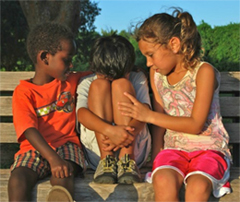Thursday, 20 April 2017
Learning Empathy

The existence of empathy and altruistic behaviour among various species of animals has been amply demonstrated. Among elephants, examples include comforting members of the herd who are frightened, rescuing others when they get get stuck in mud holes, and adopting orphaned babies. Chimpanzees and bonobos display sophisticated altruistic behaviours in dealing with weak or disabled members of their troops, trying to help them stand, bringing them food, and covering them with vegetation after confirming that they have died.
The human species is no exception. We human beings depend so much on one another and our societies are so complex that our ability to put ourselves in someone else’s shoes, to feel what they are feeling and to act accordingly, is quite obvious. Ethologists and evolutionary biologists agree that in species that form complex societies in which cooperation and mutual assistance constitute an advantage for the entire group, empathy developed naturally. (more…)
Pleasure and Pain | Comments Closed








